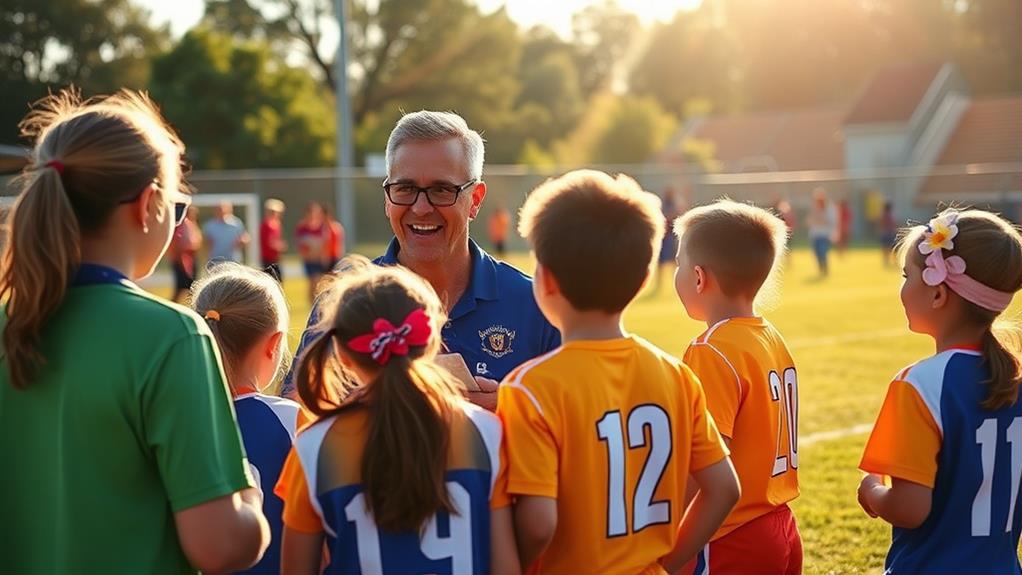Sportsmanship and fair play are essential for a positive athletic experience. They help build respect, integrity, and resilience in athletes. For instance, when athletes show empathy and inclusivity towards their teammates, it fosters teamwork and cooperation, leading to personal growth.
Accepting wins and losses with grace develops a strong character that extends beyond sports.
Fair play ensures everyone has equal opportunities, promoting a positive environment. In a fair play environment, all athletes have an equal chance to participate and succeed, regardless of their background or abilities.
This leads to improved self-esteem and stronger community bonds.
Coaches and parents play a crucial role in modeling and reinforcing sportsmanship and fair play. By demonstrating these values, they set a positive example for athletes to follow.
This, in turn, leads to improved self-esteem and stronger community bonds.
Understanding Sportsmanship

Sportsmanship is the foundation of a positive athletic experience. It emphasizes respect for opponents and adherence to rules, creating an environment where everyone can thrive.
Empathy is a crucial aspect of good sportsmanship. By understanding and appreciating the diverse backgrounds and skill levels of fellow athletes, you create an inclusive atmosphere that encourages positive behavior.
For example, acknowledging a teammate's struggle with a new skill can help them feel more comfortable and motivated to improve.
Sportsmanship contributes significantly to character development. Accepting victories and defeats gracefully teaches resilience and humility. These traits extend beyond sports into everyday life, helping you bounce back from failures and stay grounded in success.
Adhering to ethical conduct nurtures a sense of integrity, shaping you into a better individual with strong moral principles.
Cultivating sportsmanship leads to long-term benefits. Improved self-esteem and stronger connections with others are direct results of prioritizing these values. By doing so, you help create a safer, more enjoyable experience for everyone involved, making sports a truly rewarding endeavor.
Key Principles of Fair Play
Fair Play: The Backbone of Competitive Sports
Fair play is the foundation of competitive sports, promoting sportsmanship and reinforcing values like integrity and respect.
It ensures equal opportunities for all athletes, treating every participant fairly regardless of their skill level or team affiliation.
Accepting both victory and defeat with grace is a key aspect of fair play.
This acceptance instills resilience and emotional maturity in athletes, discouraging unsportsmanlike conduct like cheating or aggression.
By adhering to these principles, athletes not only improve their performance but also cultivate strong moral values that contribute to character development.
Key Principles of Fair Play:
Respect: Treating opponents and officials with dignity fosters positive relationships.
For example, congratulating opponents on their win or thanking officials for their time demonstrates respect.
Integrity: Adhering to rules and ethical standards builds trust and accountability.
Following the rules, even when no one is watching, is a testament to an athlete's integrity.
Emotional Maturity: Accepting outcomes gracefully enhances resilience and growth.
When athletes lose, they can choose to learn from their mistakes and move forward, rather than becoming angry or aggressive.
Benefits of Sportsmanship

Good sportsmanship builds well-rounded individuals by extending beyond the playing field to enhance self-esteem, confidence, and personal growth. Respectful interactions and acknowledgment of efforts contribute significantly to this growth, as they promote a positive self-image and encourage athletes to strive for excellence.
Sportsmanship fosters teamwork and cooperation, allowing athletes to improve their interpersonal skills. For instance, in team sports like basketball or soccer, players learn to work together towards a common goal, developing essential skills like communication, trust, and mutual respect.
This supportive environment enables athletes to feel valued and connected, leading to stronger bonds and a more positive team dynamic.
A culture of good sportsmanship cultivates unity and community by strengthening connections among athletes, teams, and spectators. This unity is evident in the way athletes from different teams or backgrounds come together to support a common cause or celebrate each other's achievements.
By prioritizing sportsmanship, organizations can reduce aggression and conflict during competitions, creating a safer and more positive environment for all participants.
Embracing sportsmanship principles enhances performance and character by teaching athletes valuable life skills like resilience, perseverance, and respect for others.
These skills not only improve athletic performance but also contribute to a lasting positive impact on an individual's character and the community around them.
Cultivating Positive Behavior
Cultivating Positive Behavior in Sports
Modeling respect, fairness, and empathy among all participants is crucial for fostering a positive environment in sports. This contributes to a culture of sportsmanship that enhances the overall enjoyment of the game.
To promote positive behavior, consider the following strategies:
Prioritize Teamwork by encouraging collaboration among teammates. This helps everyone understand the significance of working together. For instance, during a soccer game, teammates can work together to set up a goal, demonstrating the importance of unity in achieving a common objective.
Provide Constructive Feedback that focuses on effort and improvement rather than just winning. This approach fosters self-reflection and personal growth. For example, after a tennis match, a coach can provide feedback on a player's technique, highlighting areas for improvement and offering suggestions for future development.
Implement Conflict Resolution Skills to equip athletes with strategies to navigate challenges. This promotes emotional regulation and enhances positive interactions. In a team huddle, athletes can practice active listening and respectful communication to resolve conflicts and improve teamwork.
Engage Parents and Coaches to ensure they set a consistent example of sportsmanship, reinforcing the values of fair play and respect. By doing so, they promote a positive environment that encourages athletes to adopt these values.
For instance, parents can model respect for opponents and referees, demonstrating to athletes the importance of good sportsmanship.
How Can Sportsmanship and Fair Play Contribute to Peace and Reconciliation in Conflict Areas?
Sports for peace and reconciliation play a significant role in conflict areas. By promoting sportsmanship and fair play, individuals from different communities can come together in a spirit of unity and understanding. This fosters a sense of camaraderie and helps to break down barriers, contributing to peace and reconciliation efforts.
Role of Coaches and Parents

Coaches and parents play a crucial role in promoting sportsmanship in youth sports. Coaches set clear expectations for behavior during competitions and incorporate sportsmanship into training programs, guiding athletes to understand its importance. For instance, they emphasize respect for officials, opponents, and each other, instilling essential values for positive interactions on and off the field.
Parents significantly influence their children's behavior by modeling good sportsmanship. When they demonstrate respect and positive behavior, they reinforce the lessons coaches teach, creating a unified message for young athletes.
Open communication between coaches and parents is vital as it fosters a supportive environment, allowing athletes to express their thoughts and emotions freely.
Research shows that teams with strong parental involvement in promoting sportsmanship experience fewer conflicts and less aggression. By focusing on athletes' personal growth and effort rather than just winning, both coaches and parents cultivate a culture of respect and integrity.
This collaborative effort sets the foundation for a nurturing environment where young athletes can thrive, developing not only their skills but also their character.
Real-World Applications
Sportsmanship and fair play develop essential skills that extend beyond the sports field into academic and professional settings.
Teamwork and Collaboration are crucial skills learned through sports. By working together with teammates, you develop strong partnerships that benefit group projects and workplace teams.
For instance, in a marketing team, effective collaboration can lead to a successful product launch.
Resilience and Integrity are fostered when facing challenges in sports. You learn to bounce back from setbacks, ensuring you maintain your integrity in difficult situations.
For example, if you encounter a problem in a science project, you can draw on your sports experience to persevere and find a solution.
Respect and Inclusivity are promoted when playing alongside diverse teammates. You appreciate different perspectives, which helps you develop an inclusive mindset in social and professional environments.
In a business meeting, this mindset enables you to consider diverse opinions, leading to more effective decision-making.
Leadership Skills and Positive Social Interactions are enhanced through sports. Whether leading a team or participating as a member, you develop the skills to lead and engage positively with others.
For instance, as a team captain, you learn to motivate and guide your teammates, translating to leadership roles in academic or professional settings.
Questions and Answers
Why Is Sportsmanship so Important?
Sportsmanship is essential because it promotes a positive and respectful environment in competitive activities.
This is achieved by fostering team spirit and competitive integrity, which encourages healthy competition and ethical behavior. When athletes respect their rivals, they create a positive atmosphere that sets the tone for the entire game.
This, in turn, encourages emotional resilience among teammates, helping them to better cope with the pressures of competition.
Good sportsmanship also demonstrates leadership qualities, inspiring others to follow suit. By role-modeling positive behavior, athletes show that winning isn't the only goal, but also how the game is played.
Mutual respect creates a supportive environment, allowing everyone involved to thrive and enjoy the experience, regardless of the outcome.
Why Is It Important to Follow Rules and Show Sportsmanship?
Following rules and showing sportsmanship is essential for a fair and enjoyable game experience.
When players respect opponents and exhibit ethical conduct, they promote a teamwork spirit that enhances the experience for everyone involved.
For example, in a soccer game, if a player is fouled, the opposing team's player may apologize and help the fouled player up, demonstrating respect and good sportsmanship.
Adhering to rules develops player discipline and teaches lifelong lessons.
By following rules, players learn important values such as respect, resilience, and the importance of fair competition.
For instance, in a basketball game, a player who commits a foul and is called out by the referee learns to accept the call and move on, demonstrating respect for the rules and the game.
What Are the Key Components of Fair Play and Why Is It Crucial in Sports?
Fair play is essential in sports as it promotes a positive atmosphere and upholds integrity. It's built on respect for opponents and encourages ethical behavior among players.
This leads to a competitive spirit and teamwork values, which are vital for a healthy sporting environment.
Adopting a positive attitude is crucial in fair play, as it helps create an encouragement culture where players are accountable for their actions.
Accountability measures, such as penalties for unsportsmanlike conduct, enhance player responsibility. By doing so, fair play enriches the sporting experience and strengthens bonds within the sporting community, making every competition more enjoyable and meaningful for everyone involved.
What Is the Real Essence of Sportsmanship?
The essence of sportsmanship is about maintaining athletic integrity while competing at a high level. This means upholding ethical behavior, even when it's challenging, and demonstrating respect for opponents, teammates, and officials.
Embracing a competitive spirit involves striving to win, but not at the expense of fairness or respect for others.
Mutual respect is a key aspect of sportsmanship. This means treating others with kindness, consideration, and dignity, regardless of the outcome. For example, shaking hands with opponents after a game or congratulating them on a good play demonstrates respect and admiration for their skills.
Winning and losing with grace is also essential. Gracious losers acknowledge their mistakes, learn from them, and move forward, while respectful winners remain humble and avoid gloating or boasting about their achievements.
Effective teamwork dynamics rely on individuals prioritizing ethical behavior and maintaining a positive attitude. When team members work together towards a common goal, they build trust, communicate effectively, and support each other, leading to better performance and outcomes.
Ultimately, sportsmanship teaches valuable life lessons. By practicing sportsmanship, individuals develop emotional resilience, integrity, and respect for others, which are essential for success in all aspects of life.